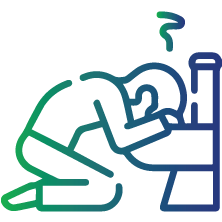
C - reactive protein (CRP) Test
About CRP Test
A C-reactive protein test (CRP test), also called a C protein test or CRP blood test, is a simple yet highly valuable diagnostic tool. This test measures the amount of C-reactive protein (CRP) in your blood sample. CRP is a special protein produced by the liver. Under normal conditions, the blood has very low levels of CRP. However, when the body undergoes inflammation, infection, or tissue injury, the liver releases a much higher concentration of CRP into the bloodstream.
Elevated CRP levels detected through a CRP blood test may be linked to a wide range of conditions, from bacterial and viral infections to autoimmune disorders, digestive issues, cardiovascular disease, and even complications such as COVID-19. Healthcare providers use the CRP level test as a screening tool, a diagnostic tool, and a monitoring tool to track disease progress or treatment effectiveness.
At Lupin Diagnostics, you can check the CRP test price in advance and conveniently book CRP test online or book C reactive protein test online with home collection or center visits. The affordability and transparency of the CRP test price make it easier for individuals to monitor their health regularly.
Functions of C-reactive protein
The C-reactive protein (CRP) plays dual roles in the body, which makes the CRP test important in clinical diagnosis:
- Anti-infective functions measured by the CRP blood test:
- Supports phagocytosis, the process by which immune cells kill harmful microorganisms.
- Activates the complement system, a critical immune mechanism.
- Anti-inflammatory functions identified through the CRP test:
- Prevents harmful systemic inflammation from spreading in the body.
- Stimulates release of anti-inflammatory substances that aid healing.
- Assists in the production of tissue factors to repair injured tissue.
By taking a C-reactive protein test / CRP level test, doctors can evaluate whether these functions are balanced or disrupted, giving insights into inflammation and infection risks.
Types of CRP Tests
There are two major categories of CRP blood tests, each serving different purposes:
- Standard C-reactive protein test:
This version of the CRP test measures elevated CRP levels, which can increase by up to 1,000 times during infections, trauma, or tissue damage. It is useful for identifying acute inflammation. - High-sensitivity CRP test (hs-CRP):
The hs-CRP test is more precise in detecting normal or slightly elevated CRP levels. This test is widely used to predict the risk of cardiovascular disease, as even small rises in CRP levels can signal underlying heart inflammation.
When you book CRP test online at Lupin Diagnostics, you can choose either a standard CRP test or high-sensitivity CRP test based on your doctor’s advice. Checking the CRP test price before booking gives full clarity on costs.
What is a CRP test used for?
CRP test is used in the diagnosis of:

Bacterial infections

Viral infections

Autoimmune diseases

Digestive diseases

Lung diseases

Coronary heart diseases

Covid-19 patient’s response to treatment
Who should get tested?
CRP test is recommended to be performed frequently for individuals if the following symptoms and risk factors present:

Fever or chills

Increased heart rate

Rapid breathing

Nausea and vomiting

Being overweight or obese

Smoking

Skin infections
Test Preparation
The CRP blood test is a simple procedure. A small blood sample is collected from a vein using a sterile needle. The entire process takes less than a few minutes.
It’s important to inform your doctor about any medications or supplements you take, as certain drugs can affect CRP levels. Do not stop prescription medicines unless your healthcare provider instructs you.
With Lupin Diagnostics, you can book C reactive protein test online, get clear instructions, and know the CRP test price before proceeding.
Standard CRP - Interpretation of results
|
Range of CRP levels |
Inference |
|
0.5-3.0mg/L |
Normal |
|
3 -10 mg/L |
Normal or slightly elevated |
|
10 -100mg/L |
Moderately elevated |
|
>100mg/L |
Markedly elevated |
High-sensitivity CRP-Interpretation of results
|
Range of CRP levels |
Inference |
|
0.5- 1.0mg/L |
Low risk of coronary artery disease |
|
1 -3mg/L |
Moderate risk of coronary artery disease |
|
>3 mg/L |
High risk of coronary artery disease |
A CRP level test helps doctors correlate your symptoms with lab results. Abnormal findings on a CRP test indicate inflammation or infection that needs medical attention.
Deviation from Normal CRP Levels
Abnormal results in a CRP test can point to different conditions:
- 3–10 mg/L: initiation of tissue damage or mild inflammation
- 10–100 mg/L: moderate elevation seen in rheumatoid arthritis, lupus, heart attack, bronchitis, or pancreatitis
- >100 mg/L: severe infections, systemic vasculitis, or trauma
Long-term high CRP levels are also associated with diabetes, pre-diabetes, insulin resistance, and cardiovascular risks. Doctors recommend regular CRP blood tests in such cases.
FAQs
What is the significance of the CRP test?
A C-reactive protein test (CRP test) is essential to detect and monitor inflammation in the body. It helps doctors manage bacterial and viral infections, autoimmune diseases, inflammatory bowel conditions, and even heart disease. The CRP blood test is considered one of the most important markers for systemic inflammation.
What factors might affect my test results?
Obesity, smoking, diabetes, and pregnancy can increase CRP levels slightly. Some medications like aspirin, steroids, or NSAIDs may reduce CRP levels. Inform your doctor before undergoing a CRP blood test / CRP level test.
How can I lower my CRP test result?
Lowering CRP levels involves healthy lifestyle habits: regular exercise, weight management, and anti-inflammatory diets. Foods like fatty fish, berries, and whole grains help lower CRP. Monitoring progress through repeat CRP tests ensures your changes are effective.
Who is at higher risk for high CRP levels?
People who are obese, smokers, pregnant (third trimester), or on hormone therapy are more likely to show elevated CRP test results. Regular CRP testing helps in early detection of risks.
How long does it take for CRP to normalise?
CRP levels rise within hours of infection or inflammation, peak within 36–50 hours, and usually return to normal within 3–7 days after recovery. Repeat CRP tests help confirm healing.
How much does a CRP test cost?
The CRP test price at Lupin Diagnostics is affordable and transparent. You can confirm the cost before booking. By choosing Lupin Diagnostics, you ensure accurate results at a fair CRP test price.
Can I book a CRP test online at Lupin Diagnostics?
Yes, you can easily book CRP test online or book C reactive protein test online through Lupin Diagnostics’ website or app. You can schedule home collection or visit a center. Reports are delivered quickly, making the process convenient and trustworthy.
Related tests
Erythrocyte Sedimentation Rate (ESR)
₹ 100-
Includes
1 Test Parameter(s)
-
The Erythrocyte sedimentation rate test is used to determine inflammatory response in the body. Inflammation is part of the immune response system. The ESR is a useful test for diagnosing inflammation, infection, trauma or malignant disease. The ESR can act as important prognostic factor in non-inflammatory conditions, such as coronary heart disease, stroke, heart failure and prostate cancer. The Erythrocyte sedimentation rate test is a blood test that determines the speed at which erythrocytes, or red blood cells (RBCs), settle to the bottom of a test tube containing a blood sample. Red blood cells often settle relatively slowly. A higher-than-average rate could be a sign of inflammation in the body. Therefore, an ESR test can help determine if one has a condition that causes inflammation, monitor the progress of inflammatory diseases, and evaluate response to treatment.
Tests At Lupin Diagnostics
C-Reactive Protein (CRP), Quantitative
₹ 400-
Includes
1 Test Parameter(s)
-
C-reactive protein (CRP) in the blood is produced by the liver and released into the bloodstream.A high level of CRP indicates inflammation . A CRP quantitative test may detect or monitor inflammation in acute or chronic diseases such as bacterial or viral infections, Crohn's disease, ulcerative colitis, rheumatoid arthritis, and other gastrointestinal illnesses such as inflammatory bowel diseases and lung conditions like asthma.
High Sensitivity C-Reactive Protein (hsCRP)
₹ 726-
Includes
1 Test Parameter(s)
ANA by Immunoblot
₹ 3,300-
Includes
1 Test Parameter(s)
-
An antinuclear antibodyies(ANA)test detects antinuclear antibodies in the blood ; theseantibodies attack the nucleus (center) of the cells. ANA detection by Iimmunoblot is the technique used to identify specificANA antibodies. High levels of ANA indicate an autoimmune disorder.This test helps diagnose autoimmune conditions and rule out lupus or other autoimmune diseases. This test is prescribed to individuals having symptoms of fever, rash, blisters, skin color changes, fatigue, joint pain, stiffness, swelling, or muscle pain.
Erythrocyte Sedimentation Rate (ESR)
₹ 100-
Includes
1 Test Parameter(s)
-
The Erythrocyte sedimentation rate test is used to determine inflammatory response in the body. Inflammation is part of the immune response system. The ESR is a useful test for diagnosing inflammation, infection, trauma or malignant disease. The ESR can act as important prognostic factor in non-inflammatory conditions, such as coronary heart disease, stroke, heart failure and prostate cancer. The Erythrocyte sedimentation rate test is a blood test that determines the speed at which erythrocytes, or red blood cells (RBCs), settle to the bottom of a test tube containing a blood sample. Red blood cells often settle relatively slowly. A higher-than-average rate could be a sign of inflammation in the body. Therefore, an ESR test can help determine if one has a condition that causes inflammation, monitor the progress of inflammatory diseases, and evaluate response to treatment.

